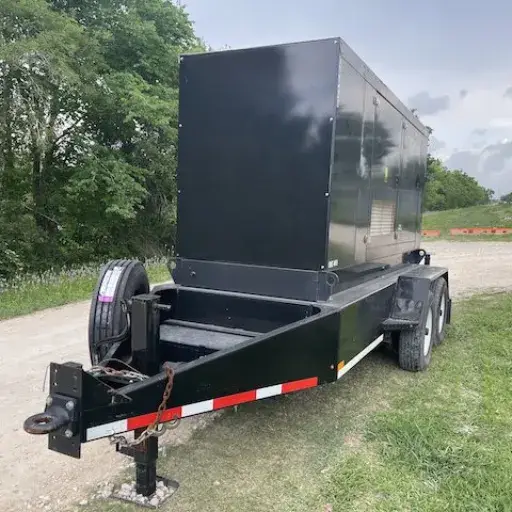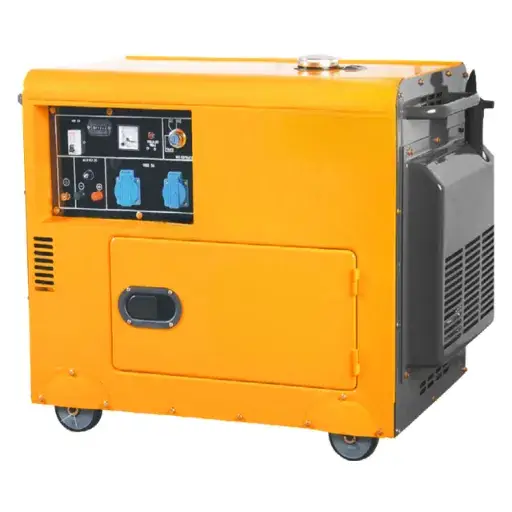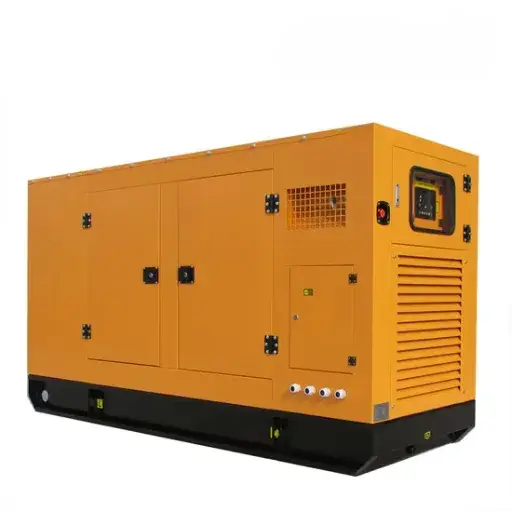It goes without saying that diesel generators are extremely popular when it comes to consistent supply of electrical power for quite several industries worldwide, both organizing a construction of a massive building, or a bridge, or a dam, or any other necessary infrastructure system, or industrializing a place during its development, or providing an emergency power back up that will stand by ready when needed, as there is no better option than diesel generators that are used in these situations. You seem to be looking for a solution that will provide power without interruptions. Then you have come to the right spot. Keep reading to learn more about why advanced diesel power generators are the cornerstone of modern-day industrial power solutions, and look for diesel generators for sale to find out which ones are suitable for your type of business.
Understanding Diesel Generators

Diesel generators guarantee a stable electricity supply and use diesel engines paired with alternators for power generation. They are widely used across industries, providing power backup for homes and business premises during power failures and ensuring safety in areas where the electricity grid is lacking. How much more efficient and durable diesel generators can be when properly maintained, making them perfect for almost all applications that require long-term power. The fact that they provide power supply on another basis, regardless of conditions, leads to the sale of diesel generators by various industries.
What is a Diesel Generator?
A diesel generator is a physical device that converts mechanical energy from a diesel engine into electrical energy using an electric generator (usually an alternator). As it runs, the engine generates rotational motion through the combustion of diesel fuel. This rotational motion is then converted to electrical energy by the generator, which operates on the principle of electromagnetic induction. Diesel generators come in a range of capacities and power options, from smaller units for home use to larger units for industrial facilities. For instance, modern generators are constructed with many features such as their ability to start automatically, a load management system, and their ability to control the amount of toxic gases they emit for optimal performance and reliability.
How Diesel Generators Work
The diesel generators presented here for sale convert the chemical energy stored in diesel fuel into mechanical energy, which is then converted into electrical energy. To begin with, a diesel engine starts a shaft, which in turn is connected to the armature. The said armature receives mechanical rotation and converts it into electrical power by inducing an electric current in a magnetic field. Electric diesel generators have several essential parts, including the engine and alternator, the fuel system, the cooling system, and the control panel. There is also a fuel system that delivers diesel to the engine, and a cooling system that prevents the machine from overheating during prolonged operation. Generators can switch on and off automatically or be controlled manually, depending on the design, and provide a reliable electrical supply for various purposes.
Key Components of Diesel Powered Generators
- ✓ Engine
- ✓ Alternator
- ✓ Fuel System
- ✓ Cooling System
- ✓ Lubrication System
- ✓ Exhaust System
- ✓ Control Panel
- ✓ Battery Charger
- ✓ Voltage Regulator
- ✓ Frame and Base
Benefits of Diesel Generators

Reliability and Longevity of Diesel Power
Diesel gensets are well-known for their durability and longevity, making them dependable in both industrial and residential sectors. The rugged construction of diesel engines enables them to withstand heavy use and adverse weather conditions better than other options. They can be used for thousands of hours and remain functional, thanks to regular maintenance which checks excessive wear and tear. Instead, they have low fuel consumption which contributes to their dependability because they need less time refilling. Recent data shows that, in most cases, diesel generators for sale are widely preferred in power-sensitive industries such as healthcare facilities, production facilities, and data centers. There is usually no concern about power supply, since they have proven over the years to be practical and efficient under any condition.
Fuel Efficiency and Operational Cost
Diesel generators are popular because they can operate on very little fuel compared to machines that use other fuels to generate the same power. This means little maintenance is required over time, especially for efforts to increase production by many players across different industries. Aside from knowing that diesel fuel is highly energy efficient, as it has a higher calorific value per unit volume than gasoline. This usually allows for more hours of operation before the refill frequency increases. The maintenance rates for diesel setups are also assumed and are often lower than those of the gas models many own, due to their heavier construction and fewer service intervals required for such motors. Therefore, one can state that diesel generators for sale are cost-efficient for power production in both internal and external settings, focusing on short-term, intermittent use.
Versatility in Applications
The uses of diesel generators seem to span the full range. As a power source, for example, one of the most common uses of diesel generators is in areas without a direct grid supply, such as mines and construction sites. This is besides the fact that hospitals, data centers, and manufacturing facilities have standby diesel generators which come in handy in case of power cuts and ensure that there are no interruptions. They are used in agriculture, for outdoor events, and for emergency units as well.
Choosing the Right Diesel Generator

Assessing Your Power Requirements
Step-by-Step Guide:
- List all equipment and appliances: Make a comprehensive inventory of all items that will need energy, noting their rated wattage.
- Calculate total load: Add up all the wattage numbers from your list.
- Account for startup power: Include devices, such as motors, that may require additional power during startup.
- Determine primary or secondary use: Decide whether the generator will serve as your primary power source or backup system.
- Identify essential loads: For standby systems, determine which equipment is critical during blackouts.
- Add safety margin: Choose a generator slightly larger than your calculated needs to ensure continuous operation and accommodate future changes.
Understanding Fuel Types and Efficiency
Different types of fuel, such as diesel, petrol, or propane, are also used in generators, each with its own receptor. Some fuels may have or cause more disadvantages than others, while others are used effectively. For instance, gasoline generators are costly and less efficient, though available at all times from almost every resource. The diesel generators for sale for industry are appropriate because they are much quieter than their counterparts and are specifically designed to power large machines. The advantages of propane and natural gas for indoor use include their durability, which makes them recommended for households and green initiatives. Factors such as which fuel will be available, how much it will cost, and whether it will pay off should be key considerations in deciding which fuel to use.
Noise Levels and Portability Considerations
Important Considerations:
Noise Levels: Inverter generators are quieter than standard generators, many claiming noise ratings of only 50-60 dB, comparable to normal conversation levels. Standard models produce louder noise and are not suitable for noise-sensitive environments.
Portability: Compact models with carry handles or wheels are more practical for travel, camping, or construction environments. Heavier units with high wattage ratings may require specialized transport equipment. Consider size, weight, and mobility needs when selecting your generator.
Comparing Diesel Generators with Other Power Systems

Diesel vs. Gasoline Generators
Diesel generators are more durable, fuel-efficient, and require less maintenance, while gasoline generators are more affordable, lighter, and better for low-load or temporary usage.
| Parameter | Diesel | Gasoline |
|---|---|---|
| Cost | Higher | Lower |
| Durability | High | Moderate |
| Fuel Efficiency | Better | Lower |
| Maintenance | Less | More |
| Portability | Heavy | Light |
| Load Handling | High | Low |
| Lifespan | Long | Short |
| Noise Level | Loud | Quieter |
Diesel vs. Natural Gas Generators
Diesel and natural gas generators differ mainly in cost, availability, efficiency, emissions, maintenance, lifespan, and noise.
| Parameter | Diesel | Natural Gas |
|---|---|---|
| Cost | Higher | Lower |
| Availability | Common | Limited |
| Efficiency | Better | Moderate |
| Emissions | Higher | Lower |
| Maintenance | Minimal | Moderate |
| Lifespan | Long | Moderate |
| Noise Level | Loud | Quieter |
Pros and Cons of Diesel vs. Propane Generators
Diesel Generators
✓ Pros:
- Fuel-efficient and power-producing
- Durability and longevity ensure application in heavy-duty and continuous operations
- Easier to maintain in simple terms
✗ Cons:
- Emissions are high compared to propane, thus detrimental to the environment
- Produce noise during operations, not suitable for noise-sensitive environments
- High initial cost
Propane Generators
✓ Pros:
- Environmentally friendlier technology with fewer emissions
- Less noise generation than diesel-powered generators
- Propane maintains quality for indefinite storage periods
✗ Cons:
- Less efficient and requires more fuel in proportion to the electricity produced
- Shorter lifespan and less amenable to hard work and heavy use
- Dependent on the external supply of propane, which is less available in certain territories
Finding the Best Diesel Generators for Sale
New vs. Used Generators for Sale
Generators, new or used, have many factors to consider to make the right investment for your needs. New ones usually come with warranties that offer peace of mind and guarantee performance. They benefit from the latest technologies, which may reduce frustration and emissions. A drawback, of course, is that they cost more upfront.
Cheap options would be used generators, making them an understandable choice for users with limited funds. For users’ detriment, they do not have the features and warranties of new ones; yet, a used generator can provide reliable power if obtained from a trustworthy source. Careful inspection of any used generator for signs of wear and tear, its usage history, and maintenance records is crucial to avoid sudden problems down the road.
Finally, when it comes to new versus used generators, the choice is dependent on your finances, current project needs, and long-term use plans. Used generators, when well serviced, may meet short-term needs or those requiring minimum output. The new ones would be preferable to anyone requiring maximum efficiency and reliability when working under heavy load or continuous-use conditions.
Reputable Dealers and Online Marketplaces
When it comes to reliable sources for purchasing generators, the primary consideration should be dealers and marketplaces that stand for product quality and customer service. Look for sellers specializing in power equipment, providing detailed product warranties, and practicing transparent pricing. Make sure the dealers have their backs with client reviews and responsive support. Additionally, marketplaces that enable buyers to thoroughly review descriptions, specifications, conditions, and so forth could be explored. Both of these criteria will provide the buyer with assurance about the generator’s reliability and their investment, promoting peace of mind.
Tips for Getting the Best Deals
Smart Shopping Strategies
- Compare Prices Between Different Sellers: Research and compare prices across dealers and marketplace websites to assure the buyer of the most competitive price. Be sure not to accept the first option without studying possibilities.
- Watch Out for Seasonal Promotions: Watch for price drop events around holidays, during clearance sales, or promotional seasons.
- Consider Package Deals: Sellers may sometimes offer bundling to provide a price advantage, including accessories or an extended warranty.
- Ask for Discounts: This can be helpful if purchasing in person. A good number of sellers might prefer to make a price reduction or toss in some extras.
- Subscribe for Newsletters or Alerts: Subscribe to one or more seller newsletters, or set alerts on your preferred platforms so you’re among the first to hear about any upcoming sales or special offers.
Reference Sources
-
Parametric Synthesis of the Digital Regulator of the Diesel Generator Set for Industrial Purpose – Discusses the design and optimization of diesel generator sets for industrial applications, focusing on power ranges from 12 to 600 kW.
-
An Alaska Case Study: Diesel Generator Technologies – Analyzes the performance metrics of diesel generators in remote areas, providing insights into their industrial use.
-
Enhancing Diesel Generator Efficiency and Emissions with CNG and Green Hydrogen: A Sustainable Solution for Power Plants – Explores the integration of CNG and hydrogen with diesel generators to improve efficiency and reduce emissions.
-
Distribution Generation by Photovoltaic and Diesel Generator Systems: Energy Management and Size Optimization – Focuses on the optimal sizing and energy management of hybrid PV/diesel systems for industrial applications.
-
Variable Speed Diesel Generators: Performance and Characteristic Comparison – Examines the performance of variable speed diesel generators, highlighting their efficiency and adaptability in industrial settings.
Frequently Asked Questions (FAQs)
Ready to Power Your Business?
Whether you need a reliable backup power solution or a primary power source for your industrial operations, diesel generators offer unmatched durability, efficiency, and performance. Explore the wide range of diesel generators for sale today and find the perfect solution for your power needs.
